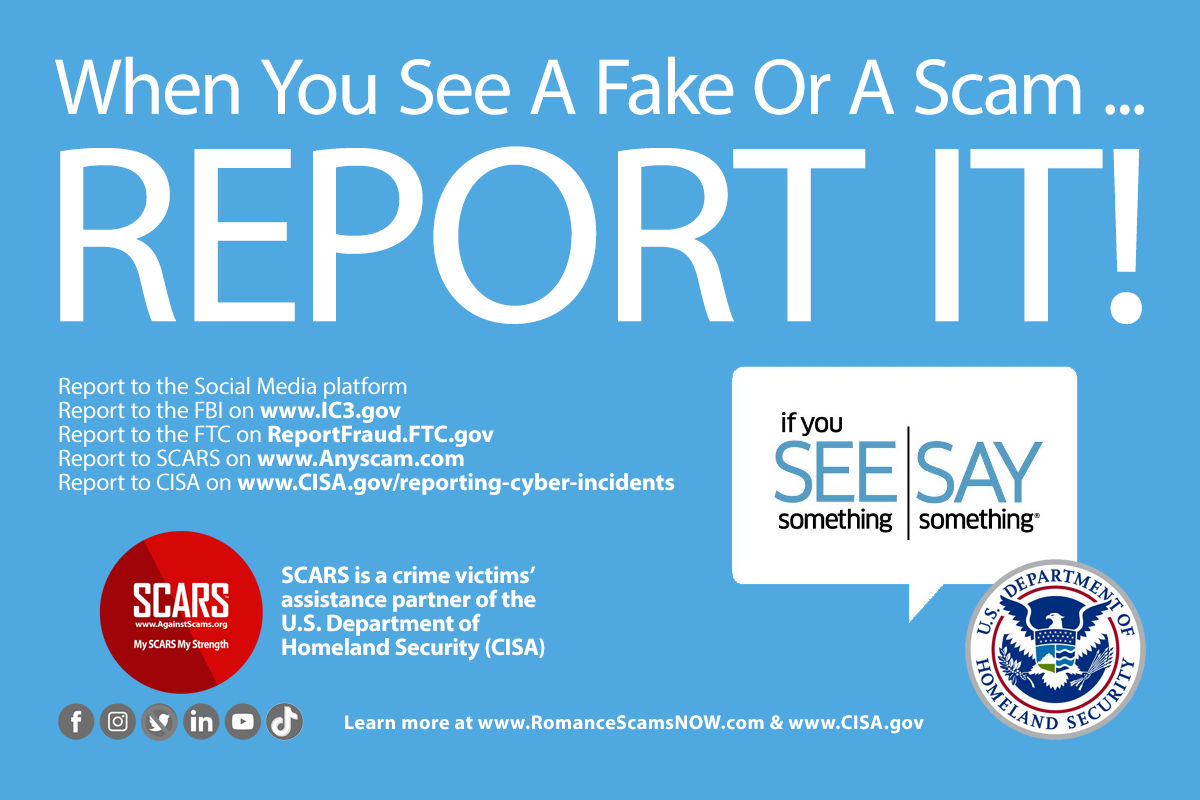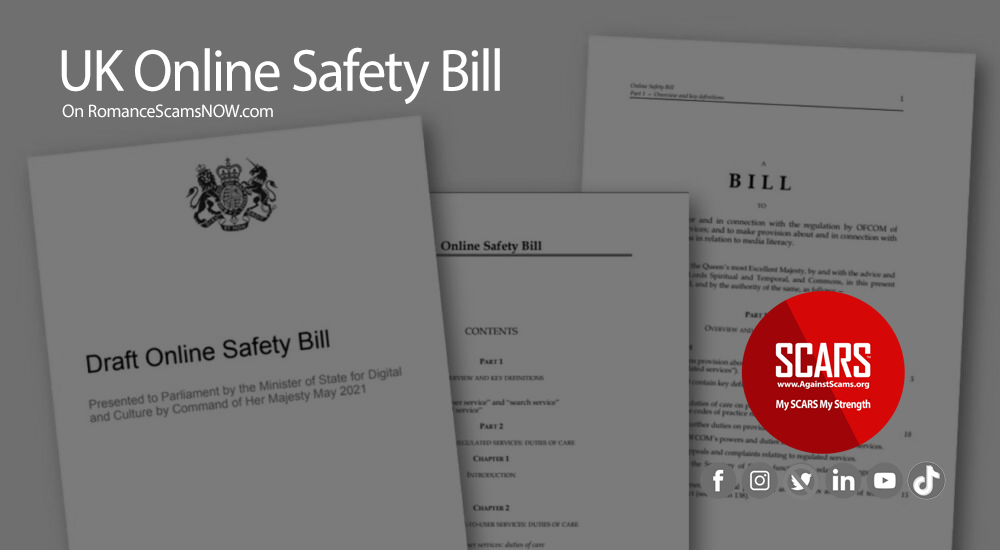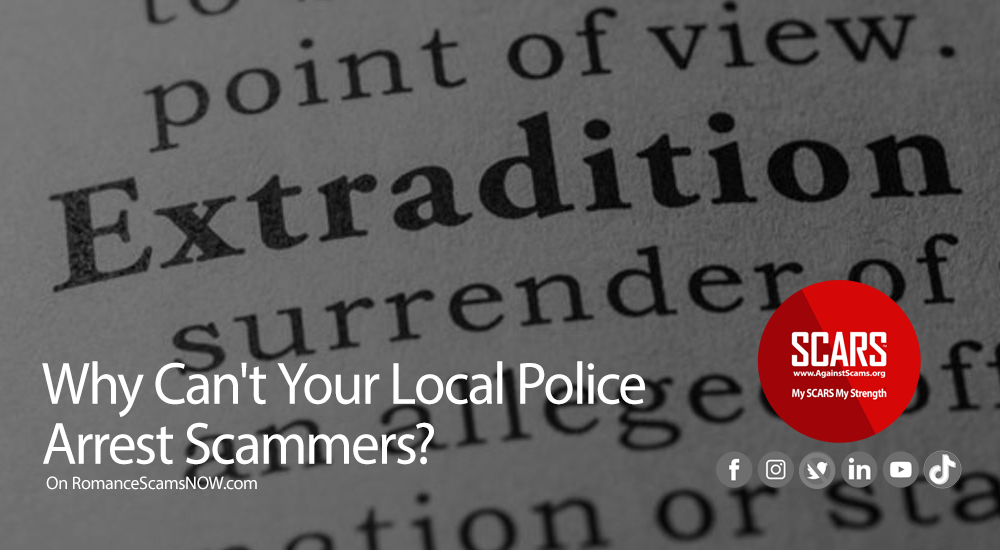
SCARS Institute’s Encyclopedia of Scams™ Published Continuously for 25 Years

Why Can’t Police Arrest Scammers? Treaties Are The Reason!
The Process Of Arresting Scammers or Criminals Outside Of Your Country Is Complicated
Let’s Start With A Few Basic Facts About Arresting Scammers
Some scammers are local, and these are treated as local criminals. Regardless of which country you live in, local criminals are investigated and arrested all the time!
Almost every local police department has a “Bunko Squad” or Fraud Department to investigate and apprehend con artists, fraudsters, and scammers in your local communities or country. Cops do a good job (generally) of keeping local scams under control.
However, 95% (or more) of all online scams originate from another country, and this is where it gets VERY tricky.
When you want to arrest scammers or a criminal in another country and then return them to your country for trial this has to be done by an “Extradition” treaty, and even then the local courts have to agree with the extradition. As we have seen in the case of the African countries, they are not very willing to extradite scammers to stand trial in another country.
Of course, the victim could go to an African country and file criminal complaints against the scammer, but this is rarely effective and is often physically dangerous.
- It is extremely dangerous to the victim physically.
- The local police are totally corrupt and will ignore the victim.
The victim can bribe the local police but this can either result in the loss of more of their money or have them be arrested for bribery. Either way, the victim loses even more.
Let’s Talk About Arresting Scammers & Extradition
Extradition is the act by one jurisdiction of delivering a person who has been accused of committing a crime in another jurisdiction or has been convicted of a crime in that other jurisdiction – into the custody of a law enforcement agency of that other jurisdiction. (When we say “jurisdiction,” think “country”)
It is a cooperative law enforcement process between the two countries and depends on the arrangements made between them. This means that they have to have a “TREATY” in place for this to happen, and that treaty needs to include the specific types of crimes covered.
If a country does not have an extradition treaty in place then criminals are completely safe. For example, Costa Rica does NOT have an extradition treaty with most other countries – so it is a criminal haven.
Besides the legal aspects of the process, extradition also involves the physical transfer of custody of the person being extradited to the legal authority of the requesting country. It is not just about Arresting Scammers!
Through the extradition process, one country typically makes a formal request to another country where they believe the criminal is living or hiding. If the criminal (fugitive) is found within the territory of the other country, then the requesting country may ask that they arrest the fugitive and subject him or her to its extradition process. The extradition procedures depend on the law and practice of the country where the criminal is found.
This involves a court process usually, and it is not certain that their local courts will even agree with a treaty, It is totally voluntary.
Between countries, extradition is normally regulated by treaties. Where extradition is compelled by laws, such as among countries, the concept may be known more generally as rendition.
Proper Identity
One of the first problems with Arresting Scammers is determining the proper identity of a scammer. Most victims do not know the real identity of a scammer. They have names and sometimes more information, but that is just the false information the victim was given, and usually, more investigation is needed to either confirm the identity of the scammer or discover their real identity.
Just because the victim has the name of someone picking up money does not mean that it is a scammer or even a real person. Scammers have “Moles” at the money transfer agencies, and it is up to the agent to confirm identity or not. The entire money transfer system in Africa is corrupted by scammers.
Confirming A Crime Suitable For Extradition
In many African countries scamming is really not much of a crime. After all, the victim voluntarily sent their money to a scammer. They really don’t view this as a crime or not a serious crime. So they rarely are interested in arresting scammers.
Only when U.S. or European Law Enforcement goes directly to the country involved can they obtain the cooperation of the local African country. Unfortunately, this is both expensive and very time-consuming, and law enforcement rarely will take these steps.
Summary
The result is that a critical lack of resources and a weak system of treaties allow most scammers to get away with it. But the great news is that scammers are being arrested:
-
2019 : 555,000+ scammers arrested worldwide*
-
2020 : 1,300,000+ scammers arrested worldwide*
-
2021 : Estimated to be over 1,000,000+ scammer arrests*
-
2022 : Estimated to be over 900,000+ scammers arrested*
* These are estimates and they may change as more countries report in. Go to AgainstScams.org for more statistics.
Some countries have moved forward seriously in their commitment to Arresting Scammers:
- The United States is now arresting dozens of scammers a week (on average)
- The EU & Europol is aggressively arresting hundreds of scammers at a time
- Nigeria’s EFCC is going to reach record levels of arrests by the end of 2021
- The EFCC has started to share information that results in arrests in the Ivory Coast, Senegal, Togo, and Benin.
- Countries around the world are taking cybercrime seriously now!
- China is the world leader in scammer arrests for scammers operating inside the PRC
Only by changing these treaties will we be able to more effectively enforce our laws against global online crime. Changing treaties is a complicated process and requires the approval of both countries involved. However, it is possible, and by pressuring politicians this process can be moved forward.
Reporting
However, it is important to always report scammers, since this alerts other potential victims AND allows law enforcement to place them on “Watch Lists”. These watch lists allow for the arrest of the scammer when they cross an international border! So please always report scammers on this website or on www.Anyscam.com and to your local law enforcement.

This article is by:
SCARS™ – Society of Citizens Against Relationship Scams Inc.
A scams & financial fraud crime victims assistance & crime prevention nonprofit organization headquartered in Miami Florida USA & Monterrey NL Mexico, with partners in more than 60 countries worldwide
If you are a Victim sign up for our FREE SCARS Support Groups at support.AgainstScams.org
To learn more about SCARS, or to Join, Volunteer, or Donate visit: AgainstScams.org
To see Scammer Photos visit www.ScammerPhotos.com
Contact Us: Contact@AgainstScams.org
-/ 30 /-
What do you think about this?
Please share your thoughts in a comment below!
LEAVE A COMMENT?
Thank you for your comment. You may receive an email to follow up. We never share your data with marketers.
Recent Comments
On Other Articles
- on Reporting Scams & Interacting With The Police – A Scam Victim’s Checklist [VIDEO]: “Yes, this is a scam. For your own sanity, just block them completely.” Feb 25, 15:37
- on Danielle Delaunay/Danielle Genevieve – Stolen Identity/Stolen Photos – Impersonation Victim UPDATED 2024: “She goes by the name of Sanrda John now” Feb 25, 10:26
- on Reporting Scams & Interacting With The Police – A Scam Victim’s Checklist [VIDEO]: “So far I have not been scam out of any money because I was aware not to give the money…” Feb 25, 07:46
- on Love Bombing And How Romance Scam Victims Are Forced To Feel: “I was love bombed to the point that I would do just about anything for the scammer(s). I was told…” Feb 11, 14:24
- on Dani Daniels (Kira Lee Orsag): Another Scammer’s Favorite: “You provide a valuable service! I wish more people knew about it!” Feb 10, 15:05
- on Danielle Delaunay/Danielle Genevieve – Stolen Identity/Stolen Photos – Impersonation Victim UPDATED 2024: “We highly recommend that you simply turn away form the scam and scammers, and focus on the development of a…” Feb 4, 19:47
- on The Art Of Deception: The Fundamental Principals Of Successful Deceptions – 2024: “I experienced many of the deceptive tactics that romance scammers use. I was told various stories of hardship and why…” Feb 4, 15:27
- on Danielle Delaunay/Danielle Genevieve – Stolen Identity/Stolen Photos – Impersonation Victim UPDATED 2024: “Yes, I’m in that exact situation also. “Danielle” has seriously scammed me for 3 years now. “She” (he) doesn’t know…” Feb 4, 14:58
- on An Essay on Justice and Money Recovery – 2026: “you are so right I accidentally clicked on online justice I signed an agreement for 12k upfront but cd only…” Feb 3, 08:16
- on The SCARS Institute Top 50 Celebrity Impersonation Scams – 2025: “Quora has had visits from scammers pretending to be Keanu Reeves and Paul McCartney in 2025 and 2026.” Jan 27, 17:45
ARTICLE META
Important Information for New Scam Victims
- Please visit www.ScamVictimsSupport.org – a SCARS Website for New Scam Victims & Sextortion Victims
- Enroll in FREE SCARS Scam Survivor’s School now at www.SCARSeducation.org
- Please visit www.ScamPsychology.org – to more fully understand the psychological concepts involved in scams and scam victim recovery
If you are looking for local trauma counselors please visit counseling.AgainstScams.org or join SCARS for our counseling/therapy benefit: membership.AgainstScams.org
If you need to speak with someone now, you can dial 988 or find phone numbers for crisis hotlines all around the world here: www.opencounseling.com/suicide-hotlines
A Note About Labeling!
We often use the term ‘scam victim’ in our articles, but this is a convenience to help those searching for information in search engines like Google. It is just a convenience and has no deeper meaning. If you have come through such an experience, YOU are a Survivor! It was not your fault. You are not alone! Axios!
A Question of Trust
At the SCARS Institute, we invite you to do your own research on the topics we speak about and publish, Our team investigates the subject being discussed, especially when it comes to understanding the scam victims-survivors experience. You can do Google searches but in many cases, you will have to wade through scientific papers and studies. However, remember that biases and perspectives matter and influence the outcome. Regardless, we encourage you to explore these topics as thoroughly as you can for your own awareness.
Statement About Victim Blaming
SCARS Institute articles examine different aspects of the scam victim experience, as well as those who may have been secondary victims. This work focuses on understanding victimization through the science of victimology, including common psychological and behavioral responses. The purpose is to help victims and survivors understand why these crimes occurred, reduce shame and self-blame, strengthen recovery programs and victim opportunities, and lower the risk of future victimization.
At times, these discussions may sound uncomfortable, overwhelming, or may be mistaken for blame. They are not. Scam victims are never blamed. Our goal is to explain the mechanisms of deception and the human responses that scammers exploit, and the processes that occur after the scam ends, so victims can better understand what happened to them and why it felt convincing at the time, and what the path looks like going forward.
Articles that address the psychology, neurology, physiology, and other characteristics of scams and the victim experience recognize that all people share cognitive and emotional traits that can be manipulated under the right conditions. These characteristics are not flaws. They are normal human functions that criminals deliberately exploit. Victims typically have little awareness of these mechanisms while a scam is unfolding and a very limited ability to control them. Awareness often comes only after the harm has occurred.
By explaining these processes, these articles help victims make sense of their experiences, understand common post-scam reactions, and identify ways to protect themselves moving forward. This knowledge supports recovery by replacing confusion and self-blame with clarity, context, and self-compassion.
Additional educational material on these topics is available at ScamPsychology.org – ScamsNOW.com and other SCARS Institute websites.
Psychology Disclaimer:
All articles about psychology and the human brain on this website are for information & education only
The information provided in this article is intended for educational and self-help purposes only and should not be construed as a substitute for professional therapy or counseling.
While any self-help techniques outlined herein may be beneficial for scam victims seeking to recover from their experience and move towards recovery, it is important to consult with a qualified mental health professional before initiating any course of action. Each individual’s experience and needs are unique, and what works for one person may not be suitable for another.
Additionally, any approach may not be appropriate for individuals with certain pre-existing mental health conditions or trauma histories. It is advisable to seek guidance from a licensed therapist or counselor who can provide personalized support, guidance, and treatment tailored to your specific needs.
If you are experiencing significant distress or emotional difficulties related to a scam or other traumatic event, please consult your doctor or mental health provider for appropriate care and support.
Also read our SCARS Institute Statement about Professional Care for Scam Victims – click here to go to our ScamsNOW.com website.

















Thank you for this information. Although I am seeing it about 2-1/2 years after creation it is still good to see that scammer arrests are happening. I understand that photos and names are not real. It would be interesting to see what celebrity impersonator scammers are located especially those that are using the romance scam platform.
I suspect my scammers are most likely based in China or Singapore.